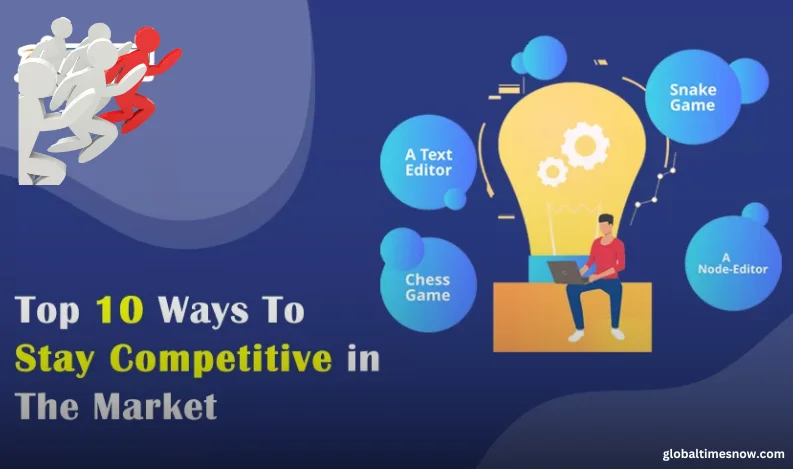In today’s dynamic and highly competitive business environment, entrepreneurs must continuously evolve to maintain an edge. The rapid advancements in technology, shifting consumer behaviors, and emerging market trends demand strategic innovation, resilience, and adaptability. Success in entrepreneurship is not solely about launching a business; it involves the ability to foresee changes, adapt quickly, and implement effective strategies to remain relevant.
This comprehensive guide provides ten crucial strategies that every entrepreneur can implement to stay ahead in a competitive market. Each section delves deeper into practical applications, real-world examples, and actionable insights to give you a clear roadmap to sustained success.
1. Embrace Innovation and Technology
Innovation and technology are at the heart of modern business success. Companies that fail to integrate technology into their operations risk becoming obsolete. Entrepreneurs must:
-
Stay updated with the latest industry trends, tools, and software.
-
Leverage artificial intelligence, automation, and data analytics to streamline operations and decision-making.
-
Invest in research and development (R&D) to enhance product or service offerings.
-
Utilize cloud computing for better data management and cybersecurity solutions.
-
Implement digital transformation strategies to improve customer experience and operational efficiency.
Deep Dive: The Power of Innovation
Innovation isn’t just about using technology; it’s about creating new business models and redefining customer engagement. For example, subscription-based models in industries like streaming and software have changed how consumers access services, giving companies a steady revenue stream.
Case Study: Tesla’s Innovation Strategy
Tesla continuously integrates technology into its business model, from AI-powered self-driving cars to battery innovations, keeping it ahead of traditional automobile manufacturers.
2. Understand Your Market and Competitors
Market research and competitor analysis are essential for business sustainability. Entrepreneurs should:
-
Conduct thorough research to identify customer needs and preferences.
-
Analyze competitors’ strategies to identify market gaps and unique selling points (USPs).
-
Utilize SWOT analysis (Strengths, Weaknesses, Opportunities, and Threats) to evaluate business positioning.
-
Engage in customer feedback loops to refine product/service offerings.
-
Keep track of economic, social, and industry trends to anticipate shifts in demand.
Deep Dive: How to Perform Market Analysis
Successful market analysis includes customer segmentation, competitor pricing studies, and tracking consumer behavior through analytics tools like Google Trends and social listening.
Example: Netflix vs. Blockbuster
Netflix identified a market shift toward digital streaming and adapted accordingly, while Blockbuster failed to evolve, leading to its decline.
3. Build a Strong Brand Identity
Branding plays a significant role in business differentiation and long-term success. Key branding strategies include:
-
Developing a unique brand story that resonates with the target audience.
-
Ensuring consistency in branding elements such as logo, messaging, and visual identity.
-
Using storytelling to build an emotional connection with customers.
-
Leveraging digital marketing, including social media and influencer collaborations, to enhance brand visibility.
-
Showcasing testimonials, case studies, and reviews to build credibility.
Deep Dive: Branding Beyond Logos
Branding is about trust and connection. Businesses that communicate strong values, such as sustainability or inclusivity, attract more loyal customers.
Example: Apple’s Brand Consistency
Apple’s consistent branding, sleek product designs, and compelling marketing campaigns create a strong, loyal customer base.
4. Prioritize Customer Experience
Customer satisfaction drives business growth and repeat sales. To enhance customer experience, entrepreneurs should:
-
Personalize interactions to improve engagement.
-
Offer exceptional after-sales service and prompt query resolution.
-
Implement customer feedback mechanisms to make data-driven improvements.
-
Use AI-driven chatbots for faster customer service.
-
Build a loyal customer community through exclusive perks and engagement programs.
Deep Dive: The Experience Economy
Businesses today are competing not just on products, but on experiences. Creating memorable customer interactions leads to brand advocacy.
Case Study: Amazon’s Customer-Centric Approach
Amazon’s focus on customer satisfaction through fast delivery, personalized recommendations, and excellent support sets it apart from competitors.
5. Focus on Continuous Learning and Adaptation
Successful entrepreneurs never stop learning. They:
-
Attend industry seminars, webinars, and training workshops.
-
Encourage employees to upskill and participate in professional development.
-
Stay updated on new technologies and evolving business models.
-
Cultivate a culture of innovation and knowledge-sharing within their teams.
-
Be open to pivoting strategies when market dynamics shift.
Example: Microsoft’s Shift to Cloud Computing
Microsoft transitioned from a software sales model to cloud computing, making it a leader in the SaaS industry.
6. Leverage Digital Marketing Strategies
Digital marketing is essential for brand visibility and customer acquisition. Entrepreneurs must:
-
Optimize websites and content for search engine optimization (SEO).
-
Utilize social media and paid advertising to reach target audiences.
-
Engage customers with high-quality content, such as blogs, videos, and infographics.
-
Implement email marketing campaigns to nurture leads.
-
Track and analyze marketing performance to refine strategies.
Example: Coca-Cola’s Social Media Dominance
Coca-Cola leverages digital campaigns, influencer partnerships, and engaging social media content to maintain its global presence.
7. Strengthen Financial Management
Entrepreneurs must have strong financial management skills to ensure business stability and growth:
-
Maintain accurate cash flow records and budgeting plans.
-
Reduce unnecessary expenses and optimize operational costs.
-
Explore different revenue streams to diversify income sources.
-
Invest strategically in long-term growth opportunities.
-
Seek professional financial guidance when necessary.
Example: Warren Buffet’s Investment Discipline
Buffet’s long-term financial planning and conservative investment strategies have made Berkshire Hathaway a powerhouse.
8. Develop a Resilient Mindset
Entrepreneurship is filled with challenges; resilience is key to long-term success:
-
Learn from failures and turn setbacks into growth opportunities.
-
Stay emotionally and mentally strong during tough times.
-
Cultivate a problem-solving attitude for unforeseen circumstances.
-
Build a strong network of mentors, advisors, and industry experts.
-
Keep a positive and adaptable mindset in evolving business landscapes.
Example: Elon Musk’s Perseverance
Despite multiple failures, Musk continued pushing forward with Tesla and SpaceX, leading them to success.
9. Build Strong Business Relationships
Networking and partnerships are essential for long-term success. Entrepreneurs should:
-
Establish relationships with industry leaders and mentors.
-
Collaborate with complementary businesses for mutual benefits.
-
Maintain transparency and trust in business dealings.
-
Build a strong customer relationship management (CRM) system.
-
Attend networking events and industry summits.
Example: Starbucks & Spotify Collaboration
This partnership allowed Starbucks customers to influence in-store playlists, enhancing customer experience.
10. Optimize Business Operations
Efficiency in operations helps businesses scale and sustain growth:
-
Implement automation tools to streamline processes.
-
Reduce overhead costs while maximizing productivity.
-
Use project management tools to enhance team collaboration.
-
Monitor key performance indicators (KPIs) for improvements.
-
Continuously refine operational strategies for efficiency.
Example: Toyota’s Lean Manufacturing
Toyota’s lean production system enhances efficiency and reduces waste, making it a global leader.
Conclusion
Entrepreneurs who innovate, adapt, and focus on customer satisfaction will remain competitive. Success requires continuous improvement, resilience, and strategic execution.
You may also like:-






















